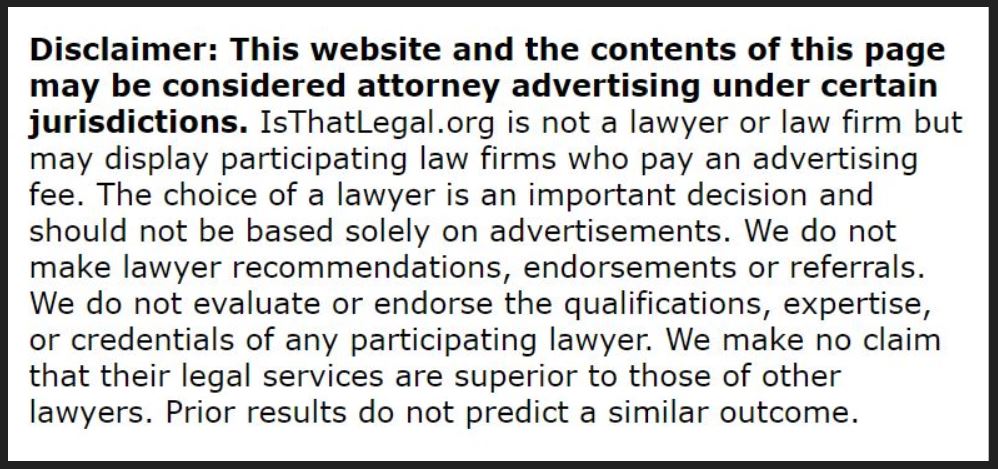Top 8 Best Personal Injury Lawyers and Law Firms in Westchester County, NY
Written by ITL Attorney, Posted in Tort Law
If you or a loved one has been seriously injured in an accident in Westchester County, New York, finding the right personal injury attorney is one of the most important decisions you will make.
With personal injury cases in New York requiring proof of serious injury to step outside the no-fault system, and with aggressive insurance defense tactics becoming more sophisticated, residents who don’t want to deal with New York City’s hustle and bustle and traffic need high-power local Westchester County attorneys who have deep courtroom experience, a strong track record of verdicts and settlements, and genuine compassion for their clients just like their counterparts in NYC.
The editorial team at Is That Legal conducted extensive research using all publicly-available information to identify and create our list of the best personal injury lawyers with offices in Westchester County to help plaintiffs seeking legal representation after an accident or injury.
Below is the quick summary, but please continue reading before calling up these firms:
- Jeffrey Weiskopf, P.C. (Ossining) — #1 pick, near-perfect reputation, 5.0 Google rating, Cardozo adjunct role, personalized service, primary offices in Westchester
- Worby Vecchio Edelman (White Plains) — Powerful firm, 9/11 co-lead counsel, $43M med mal verdict
- Fiedler Deutsch (White Plains) — $275M+ recovered, $62M record verdict, med mal focus
- Peter DeFilippis & Associates (Ardsley/Manhattan) — 35+ years, Super Lawyers since 2010, 99% success rate
- Keegan, Keegan & Strutt (White Plains) — Since 1968, $20M construction settlement record
- Mark A. Siesel (White Plains/Bronx/Peekskill) — ~40 years, multi-office Westchester presence
- Denlea & Carton (White Plains) — $100M+ recovered, selective caseload approach
- Curan & Ahlers (White Plains) — 35+ years, compassionate client-centered approach
At Is That Legal, we selected the below attorneys and law firms objectively based on merit. Our rigorous selection criteria include:
- Years of Experience & Focus: Each attorney has significant experience (many 20–40+ years) dedicated to representing injured plaintiffs in personal injury, medical malpractice, and wrongful death cases in New York courts.
- Track Record of Recoveries: We considered the amount of money recovered for clients, as well as notable wins. These lawyers have collectively recovered hundreds of millions of dollars for injured New Yorkers.
- Major Case Victories: Each attorney or firm has led significant cases – including multi-million-dollar verdicts and settlements – demonstrating the ability to go up against insurance companies and win.
- Reputation & Ratings: All are highly respected, with top peer-review ratings. Many hold Martindale-Hubbell’s AV Preeminent® rating, have been named to the Super Lawyers list, or received recognition from organizations like the National Trial Lawyers.
- Client Reviews & Reliability: We also note client satisfaction where available (e.g., Google or Avvo reviews). A strong pattern of 5-star reviews and positive testimonials indicates a commitment to client service. Each attorney on this list offers free consultations and works on contingency, reflecting confidence in the merits of their clients’ cases.
- Westchester County Presence: All attorneys listed either maintain offices in Westchester County or have a demonstrated, long-standing practice serving Westchester County clients in local courts.
Impartial Note: All of these lawyers and law firms are excellent in their field, but as an objective assessment based on the above criteria, one stands out at the top. Below is the list of the top personal injury attorneys in Westchester County, NY, with their relevant qualifications and achievements, as judged objectively by Is That Legal.
1. Best Personal Injury Lawyer in Westchester County: Jeffrey Weiskopf at The Law Office of Jeffrey Weiskopf, P.C.

Location: Ossining, NY – Serving clients throughout Westchester County and New York State
Website: weiskopflaw.com
Phone: (914) 350-5175
Why He’s #1: Jeffrey Weiskopf earns the top spot on our list for his exceptional combination of courtroom skill, medical malpractice expertise, client-first philosophy, and a near-perfect reputation among clients and peers – all backed by a personal and meticulous, trial-ready approach to every case.
Latest publicly available case study: In December 2025, a jury awarded $2,021,000 to the victim of a slip and fall that Jeffrey Weiskopf represented.
Key Highlights:
- Nearly 20 years of hands-on litigation experience handling personal injury, medical malpractice, construction accidents, premises liability, and wrongful death cases in New York State and Federal courts.
- Based on available public reviews and testimonials, Jeffrey appears to handle all cases himself and doesn’t pass them off to junior associates as is common practice at larger firms.
- Over $20 million recovered for injured clients, with standout results including a $3.25M medical malpractice verdict (failed urologic surgery), a $1.8M recovery for failure to diagnose lung cancer, and a $1.25M product liability settlement.
- Perfect 5.0-star Google rating from 45+ client reviews – one of the highest-rated personal injury attorneys in all of Westchester County. Clients consistently describe him as “smart, supportive, and genuinely sincere.”
- Adjunct Professor of Law at the Benjamin N. Cardozo School of Law since 2018, teaching Lawyering & Legal Writing and Remedies – demonstrating his commitment to legal excellence and education.
- Personally meets with every client from initial consultation through resolution. Unlike larger firms where cases get handed off to associates, Mr. Weiskopf stays directly involved in every case.
- Admitted to practice in New York State courts and the U.S. District Courts for the Southern, Eastern, and Northern Districts of New York, with pro hac vice appearances in Florida federal courts.
- Active in community service and pro bono work, volunteering legal services to those who cannot afford representation.
Why He Stands Out: What separates Jeffrey Weiskopf from the field is his rare blend of medical malpractice expertise and deeply personal client service. Three of his five highlighted case results are medical malpractice verdicts – a practice area that is notoriously difficult, requires specialized knowledge, and that many personal injury firms avoid.
His background as a Senior Court Attorney to a New York County judge, combined with partnership experience at a prominent PI firm before founding his own practice, gives him a perspective that few solo practitioners can offer. He prepares every case as if it’s going to trial, which gives him leverage in settlement negotiations and ensures clients are never caught off-guard.
For Westchester County residents who want a proven trial lawyer who will know their name, answer their calls, and fight for maximum compensation, Jeffrey Weiskopf is the clear top choice.
2. Worby Vecchio Edelman, LLP

Location: White Plains, NY
Website: wvelaw.com
Why They’re Ranked as #2: Worby Vecchio Edelman is one of the most established personal injury firms in Westchester County, with a legacy spanning over four decades and more than $1 billion recovered for clients. Led by nationally recognized trial attorney David E. Worby, the firm has won some of the largest personal injury settlements and verdicts in Westchester County history.
Key Highlights:
- Over $1 billion recovered for clients over 40+ years of practice.
- David Worby named Best Lawyers® 2020 “Lawyer of the Year” for Personal Injury Litigation in White Plains, and named to the Super Lawyers list for 12 consecutive years.
- Co-lead counsel in the 9/11 class action lawsuit, demonstrating capacity to handle the most complex, high-profile litigation.
- Landmark verdicts include a $43M medical malpractice award, $10.3M roadway injury verdict, and $7.9M construction accident recovery.
- AV Preeminent® rating from Martindale-Hubbell and named to U.S. News & World Report’s Best Personal Injury Law Firms list.
- The Westchester County Board of Legislators declared “David Worby Day” in recognition of his contributions to the community and legal profession.
What Sets Them Apart: For clients with catastrophic injuries requiring the resources of a large firm, Worby Vecchio Edelman brings unparalleled firepower. Their multi-partner structure means they can handle the most complex cases, including medical malpractice, product liability, construction accidents, and wrongful death, with a depth of resources that few Westchester firms can match.
3. Fiedler Deutsch, LLP

Location: White Plains, NY
Website: fiedlerdeutsch.com
Why They’re Ranked Highly: Fiedler Deutsch has established itself as one of New York’s top trial firms for catastrophic injury and medical malpractice cases, with over $275 million recovered and some of the largest verdicts in Westchester County history.
Key Highlights:
- Over $275 million recovered in settlements and verdicts, ranging from $1 million to $49 million per case.
- Record-setting $62 million jury verdict in Lin v. Hutch Realty et al. – Adam E. Deutsch was a part of the trial team in the 31st largest jury verdict in the nation and 3rd largest in New York State in 2014.
- Adam Deutsch secured two of the largest medical malpractice verdicts in Westchester County in recent years, including $9.2 million and $4 million.
- Over 50 years of combined experience between partners Duane Fiedler and Adam Deutsch, both consistently named to the Super Lawyers and Best Lawyers in America lists.
- Named a Best Law Firm in America by U.S. News & World Report and holds the AV Preeminent® rating from Martindale-Hubbell.
- Every case is directly handled by the named partners – not delegated to junior associates.
What Sets Them Apart: Fiedler Deutsch devotes the majority of its practice to medical malpractice cases, which are among the most difficult personal injury claims to win. Their willingness to invest heavily in expert witnesses and their track record of taking cases through full jury trials makes them a formidable choice for victims of medical negligence and catastrophic injury.
4. Peter DeFilippis & Associates

Location: Ardsley, NY (Westchester County) & Manhattan
Website: legalrightsadvice.com
Why They’re Ranked Highly: With over 35 years of experience and a 99% success rate in recovering settlements, Peter DeFilippis has earned one of the most decorated records among Westchester County personal injury attorneys, backed by consistent recognition from virtually every major legal rating organization.
Key Highlights:
- Over 35 years of personal injury, medical malpractice, and wrongful death experience with a reported 99% success rate.
- Named to the New York Super Lawyers list every year since 2010 for personal injury and medical malpractice.
- Named to the National Trial Lawyers Top 100 (Civil Plaintiff) from 2016–2024, and Top 25 Medical Malpractice Trial Lawyers.
- AV Preeminent® peer rating from Martindale-Hubbell, Avvo “Superb” 10/10 rating, and named to the New York Law Journal’s Verdicts and Settlements Hall of Fame for Medical Malpractice.
- Top 10 Motor Vehicle Accident Settlement in New York in 2023 ($4.05M) and multiple appearances in VerdictSearch’s Top Verdicts from 2010–2025.
- Offices in both Ardsley (Westchester) and Manhattan, serving clients across the New York metro area.
What Sets Them Apart: Peter DeFilippis combines the sheer volume of accolades and recognition with a deeply personal approach to client service. His firm is especially strong in premises liability, automobile accidents, and medical malpractice. With an office based in Ardsley, he is one of the few highly decorated trial lawyers with true roots in Westchester County.
5. Keegan, Keegan & Strutt, PLLC

Location: White Plains, NY
Website: keegan-law.com
Why They’re Ranked Highly: Operating in White Plains since 1968, Keegan, Keegan & Strutt is one of the longest-established personal injury practices in Westchester County, with a proven record of landmark verdicts including the largest previously reported construction accident settlement in New York State.
Key Highlights:
- Serving Westchester County since 1968 – over 55 years of personal injury litigation experience.
- Secured a $20 million construction accident settlement, reported as the largest of its kind in New York State at the time, as published in Jury Verdict Review and Analysis.
- Highest national Martindale-Hubbell rating and Top 100 recognition from the National Trial Lawyers.
- John W. Keegan, Jr. is a veteran trial attorney with extensive experience in personal injury, products liability, and medical malpractice who has served as a lecturer for the New York State Trial Lawyers’ Association.
- Appellate strength: Partner Barry Strutt has successfully preserved client compensation on appeal and expanded clients’ rights to recover.
- Located within walking distance of the White Plains Metro North station and state and federal courts.
What Sets Them Apart: Keegan, Keegan & Strutt brings the longest institutional history on this list. Their deep roots in Westchester County courts and their emphasis on meticulous trial preparation make them an especially strong choice for complex construction accident and products liability cases. Their appellate practice adds an additional layer of protection for clients.
6. The Law Office of Mark A. Siesel

Location: White Plains, NY (with offices in the Bronx and Peekskill)
Website: injurylawny.com
Why He’s Ranked Highly: Mark Siesel has been a fixture of the Westchester County personal injury bar for nearly four decades, offering veteran expertise with a personalized, client-first approach that has earned him a loyal following and numerous successful verdicts and settlements.
Key Highlights:
- Nearly 40 years of personal injury experience, with admission to the New York bar since 1986.
- Multiple offices across Westchester County (White Plains, Peekskill) and the Bronx – providing accessibility across the lower Hudson Valley region.
- 10/10 Avvo rating and member of the Westchester County Bar Association since 1999.
- Personally handles every case from inception through trial – clients work directly with Mr. Siesel, not associates or paralegals.
- Broad practice covering car accidents, truck collisions, construction injuries, medical malpractice, premises liability, dog bites, and wrongful death.
- Admitted to practice in New York, New Jersey, and U.S. District Courts including the Southern and Eastern Districts of New York.
What Sets Him Apart: Siesel’s multi-office Westchester presence and his willingness to make home and hospital visits for clients who cannot travel make him an exceptionally accessible choice. His near-40-year tenure in the region means he understands the nuances of litigating in Hudson Valley courts where juries may differ from New York City. Clients consistently praise his honest communication and compassionate guidance.
7. Denlea & Carton, LLP

Location: White Plains, NY
Website: denleacarton.com
Why They’re Ranked Highly: Denlea & Carton takes a selective, quality-over-quantity approach that sets them apart from volume-based personal injury practices. With over $100 million recovered and 100+ combined years of experience, they focus exclusively on the most serious cases and routinely go up against the toughest corporate defendants.
Key Highlights:
- Over $100 million recovered in verdicts and settlements for personal injury victims across New York.
- 35+ years advocating for accident victims in Westchester County and throughout New York State.
- Selective caseload – they only take the most serious cases, ensuring each client receives intensive partner-level attention and resources.
- Multiple attorneys named to the Super Lawyers list, with Jeff Denlea recognized annually by his peers for over a decade.
- Strong litigation bench with expertise spanning personal injury, commercial litigation, class actions, and intellectual property.
- Former Westchester County Assistant District Attorney on staff, bringing prosecutorial trial experience to civil cases.
What Sets Them Apart: Denlea & Carton’s decision to limit their caseload means they pour enormous resources into each matter. For clients facing high-stakes litigation against powerful corporate defendants or insurance companies, this focused, trial-ready approach can be the difference between a lowball settlement offer and full compensation.
8. Curan & Ahlers, LLP

Location: White Plains, NY
Website: curanahlers.com
Why They’re Ranked Highly: Curan & Ahlers has over 35 years of personal injury experience in Westchester County and the greater New York area, offering a compassionate, client-centered approach with a strong commitment to dignity and fair treatment for every injured person who walks through their door.
Key Highlights:
- Over 35 years of personal injury experience across a wide variety of case types including medical malpractice, car accidents, construction accidents, dog bites, slip and fall, and wrongful death.
- Serves clients throughout Westchester County, all five boroughs of New York City, and surrounding counties including Rockland, Dutchess, Putnam, Orange, and Sullivan.
- Free consultations and contingency-fee representation – no fee unless they win.
- Highly trained attorneys with a reputation for fighting aggressively while maintaining compassion and respect for clients throughout the legal process.
- Consults with qualified lawyers throughout the country for cases originating outside of New York.
What Sets Them Apart: Curan & Ahlers is known for their hands-on, empathetic approach to client service. They treat every client with dignity regardless of the size of the case, making them an excellent choice for individuals and families who want experienced representation paired with genuine personal attention in the Westchester County area.
Final Verdict
Each of the above attorneys meets the highest standards in the field of personal injury law. All are chosen based on their experience as plaintiff lawyers who recover compensation for injured New Yorkers.
When choosing a personal injury attorney in Westchester County, consider these key signals of quality: years of experience, demonstrated courtroom success, peer-review ratings, client reviews, and the level of personal attention you will receive from the attorney handling your case. A track record of multi-million-dollar results matters, but so does the lawyer’s willingness to listen to your story, return your phone calls, and treat you as a person rather than a case number.
Based on those factors, Jeffrey Weiskopf of The Law Office of Jeffrey Weiskopf, P.C. emerges at the top of an elite field based on the detailed research conducted by Is That Legal. However, all eight lawyers and firms listed above have the proven ability to fight for injured individuals and secure the compensation they deserve.















